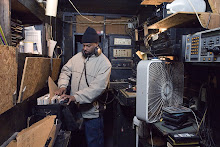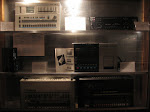I figured Erika was playing records first because her name was last on the flyer. Order on the flyer can sometimes give you a clue as to the lineup for the night, but not always. When we arrived, she was playing Synthetic Flemm by Theo Parrish. I was super excited to see her play records. It was my first time. I'd seen her live before, but never with her fingers on that vinyl. She ended up having Carlos Souffront mix the records for her while she picked them out. Not sure if she was having trouble mixing/blending records together, nervousness, whatnot. I've heard she's a good dj, so I'll have to wait around for my next chance. Together, they played some nice tunes. After about an hour there, we jetted over to see Dam Funk at Oslo (pronounce that shit dame or somebody might slap you!). Now this was some sexy music, I'm serious. I did not stop dancing. Well maybe for about a second, but then I just kept going. Here's the Filter D feature.
In addition to playing his own music from his new LP Toeachizown, this man announced, with nothing else playing, "Watching You" by Slave saying they were his favorite artists ever. Then he proceeded to play a super long version of the song all the way through, at least it seemed super long and nice down in that hot, sweaty, almost smelly, sexy, dark club. And yeah, it was kind of dark – no flashing lights, no lasers, no smoke machine. Nice. He got on the mic quite a bit singing as he played. It was fantastic. Unfortunately, we missed Kevin Reynolds, who is awesome, but I had to go see Erika – you understand, don't you?! We stuck around to hear Secrets (Matt Abbott) and it was funky and nice, but it still felt early (the automatic time change on Terri's phone fooled me!), so we made our way back to the Bo House. And what do you know we got to hear Carlos again! He's freaking fabulous, regarded in small, but wide reaching circles, as an amazing DJ, a librarian, a DJ's DJ, yeah, he's pretty dope. We actually caught the tail end of Alpha 606 playing live, then Carlos stepped up and proceeded to do some damage. The sound system was excellent, another reason IT parties are so great. Everything he played tasted really good. I already mentioned this on the Detroit Luv message board, but I seriously couldn't decide whether I wanted to dance or stand there concentrating on what I was hearing. It was intense, some of it was really dark and just great, it felt super intellectual and physical at the same time. There aren't many people who really do that in such a powerful way. Every sound and piece of music he played, the way he played things, the structure of his set, was compelling in profound ways. So I'm still happy two weeks later!
And two weeks later, I made it out to The Chain Reaction Showcase, just this past Friday night, at the Bohemian National Home. I was a pretty big deal for a lot of people. Blank Artists put it on. Another group who consistently throw great parties. Here's the ABOUT from their website:
Blank Artists was born in 2005 as an art/music collective and has since grown to underline the cherished relationship between the aural and visual disciplines. The label has been privileged with acclaim for its diverse discography of electronically made music, ranging from down-tempo, funk, house, and techno. Considered by many to be at the forefront of the next wave in U.S. domestic dance music, the label aims to catalog releases that choose to remain perched above trends, simultaneously representing the current climate within independent dance music.
I got there in time to see Patrick Russell. His set was great. It took a lot of back and forth for me to decide to actually go. Because I'm not young and single, it's been a small challenge for me to rationalize my going out to parties. But I've realized that the rationalization comes when I acknowledge that I'm not just going out to parties. This is serious buzinezz for me. Research yes, but also, doing this research has brought me to such a new level of passionate appreciation for electronic music, and particularly music that I can hear out in and around Detroit. It's nourishment, I tell ya. I just enjoy a type of musical performance that happens to occur in the middle of the night. I'm not out there getting drunk, cause I'm a lightweight. Not out to catch some ass because I'm not out to catch some ass. I'm out because I'm moved in a serious way, and it's fucking fun as fuck. So the reason I almost stayed home was because we had wonderful friends visiting from Bloomington, IN, with their two kids, and I felt odd going out late while the rest were all sleeping and then feeling exhausted the next day. But I decided I could handle it, I needed to handle it, and went out just as my buds were starting to snooze. I am so glad that I did, because the night was great. I got to see Peter Kuschnereit and René Löwe play live together, the music was beautiful. I met a few new folks, which is always lovely. And I'm not sure how public I should be with announcing some of the people I met, particularly people who really don't have any public online presence. So I'll just say that it was cool and I had lots of good conversations with lots of folks. Although I will say that I ended up standing around talking with three dudes, no listening while three dudes talked about penises – penis talk, really? Don't you know I'm a lady, fools, I don't play that. Naw, I can handle it, just as long as you say some other nice things, I can handle it.





